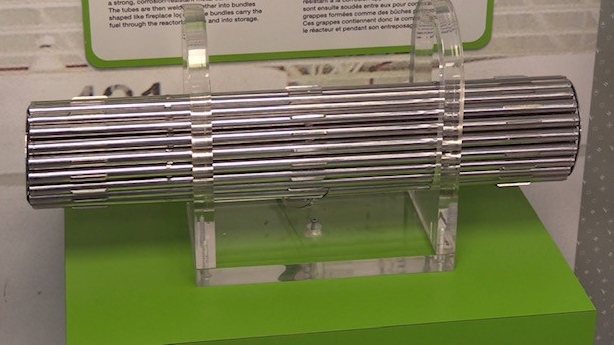Citizens call for underground nuclear waste plan to be scrapped
Citizens concerned about plans to bury Canada’s most radioactive nuclear waste in a massive underground facility said it’s time the Nuclear Waste Management Organization went back to the drawing board.
“There is a viable alternative to the transportation and burial of high level radioactive wastes. Nuclear fuel waste should be managed at the point of generation, by making on site storage more robust, and adopting a program of rolling stewardship,” explained Charles Faust of We the Nuclear Free North during a Queen’s Park media conference on Tuesday.
Three million used nuclear fuel bundles that once powered Ontario nuclear plants are currently stored at those plants, in near ground and above ground facilities. The Nuclear Waste Management Organization (NWMO), tasked with finding a home for Canada’s mounting volume of nuclear waste, said that’s not a long term solution.
“This repository would contain that fuel in an underground vault surrounded by rock. And, that rock would protect that material for the many years to come, many decades, and millennia, in which we need to protect that material,” said NWMO VP of Site Selection, Lise Morton.
Bill Noll, who lives near one of the proposed sites for the underground waste repository, argues that keeping the waste where it is also eliminate the very contentious site selection process currently underway.
“You have those that are supporting, and those that are not. Neighbours don’t talk to one another, but that’s what the process has done,” said Noll, who also represents Protect our Waterway - No Nuclear Waste, from the Municipality of South Bruce.
 Example of used nuclear fuel bundle in Teeswater from March 2019. (Scott Miller / CTV News)
Example of used nuclear fuel bundle in Teeswater from March 2019. (Scott Miller / CTV News)
“There will be uncertainties where we employ the proximity principle. But, those are uncertainties that can be managed, and monitored, and remediated. That is where we will get greater certainty, by keep the waste at the reactor site,” said Brennain Lloyd, of NorthWatch.
“There’s only ever been one option considered, that is to create a cavern underground, bury it, and seal it, and walk away,” said Faust.
While the NWMO does have in their proposal a plan to close the facility around 2159, after 40 years of operation, and 60 years of extended monitoring, Morton said that decision will ultimately be made by people not even born yet.
“It will be future generations who decide that they have enough data, that they’ve monitored enough, and that they feel comfortable closing the repository,” she said.
We the Nuclear Free North and Protect our Waterways - No Nuclear Waste presented an 1,140 signature petition to Queen’s Park this week urging the provincial government to employ the proximity principle, and keep Canada’s high level nuclear waste above ground.
By the end of next year, the NWMO will decide if a site near Ignace in Northern Ontario, or a site near Teeswater, in Bruce County, will host Canada’s high level nuclear waste forever. Both communities will vote on their willingness to host the project, as will the Indigenous communities surrounding both areas.
The project will cost approximately $25 billion to construct, and will lead to approximately 700 operational jobs.
CTVNews.ca Top Stories

Donald Trump says he urged Wayne Gretzky to run for prime minister in Christmas visit
U.S. president-elect Donald Trump says he told Canadian hockey legend Wayne Gretzky he should run for prime minister during a Christmas visit but adds that the athlete declined interest in politics.
Ho! Ho! HOLY that's cold! Montreal boogie boarder in Santa suit hits St. Lawrence waters
Montreal body surfer Carlos Hebert-Plante boogie boards all year round, and donned a Santa Claus suit to hit the water on Christmas Day in -14 degree Celsius weather.
Historical mysteries solved by science in 2024
This year, scientists were able to pull back the curtain on mysteries surrounding figures across history, both known and unknown, to reveal more about their unique stories.
Montreal man dead after boat explodes in Fort Lauderdale
A Montreal man is dead and several others are injured after a boat exploded in Fort Lauderdale, Florida.
Mother-daughter duo pursuing university dreams at the same time
For one University of Windsor student, what is typically a chance to gain independence from her parents has become a chance to spend more time with her biggest cheerleader — her mom.
Azerbaijani airliner crashes in Kazakhstan, killing 38 with 29 survivors, officials say
An Azerbaijani airliner with 67 people onboard crashed Wednesday near the Kazakhstani city of Aktau, killing 38 people and leaving 29 survivors, a Kazakh official said.
King Charles III focuses Christmas message on healthcare workers in year marked by royal illnesses
King Charles III used his annual Christmas message Wednesday to hail the selflessness of those who have cared for him and the Princess of Wales this year, after both were diagnosed with cancer.
Alberta premier hopes for health reform payoff in 2025, regrets deferring tax cut
"It may have been better for Albertans if we'd implemented and then found a way to be able to pay for it."
NFL's Netflix debut on Christmas Day kicked off without a glitch
Mariah Carey opened Wednesday’s doubleheader with a taped performance of “All I Want for Christmas is You” before Patrick Mahomes, Travis Kelce and the two-time defending Super Bowl champion Kansas City Chiefs faced off against Russell Wilson, T.J. Watt and the Pittsburgh Steelers.


































